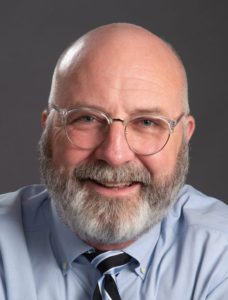Of all the things I’ve learned through a few decades of mentoring young writers and pastors, one predictor of success stands out above all. This one thing rises above raw talent, education or privilege — all of which may play a role in a person’s success.
That thing is having a teachable spirit.
Give me a choice between hiring someone with tremendous talent who’s unwilling to learn or someone with less talent who’s hungry to learn, and I’ll take the second choice every time.

Mark Wingfield
Having a teachable spirit requires a combination of humility and curiosity. Humility always to admit you don’t know it all, and curiosity always to want to learn more. It is not enough to admit you’re not all-knowing if you have no drive to learn more. And it is not enough to study other ideas or ways of doing things if you’re not willing to be changed by any of them.
The lack of a teachable spirit, in my experience, transcends gender, race, education and all other ways we might categorize people. It is a personality trait that is hard to overcome because, by definition, the person is not open to new information.
Having spent half my professional life as a journalist and half as a pastor involved in one of the nation’s premier clergy apprenticeship programs, I’ll also tell you this: It is easier to train a journalist than to train a pastor. There are two reasons this is most likely true.
First, all professional journalists have editors; most pastors do not. Leaving out the world of independent blogging, most journalists submit their work to someone else who at least proofreads it or more likely edits it. Journalism, like most other professional fields, requires a collaborative process. Once a preacher leaves seminary or a pastoral residency program like ours in Dallas, they most likely never again will have anyone seriously edit their sermons, nor will they have anyone coach them on vocal technique and sermon delivery.
Second, the amount of ego necessary to respond to the call of being a pastor — a very public, very authoritative role — can so easily overtake a person that they begin to believe their own publicity. Whether you’re an introvert or an extrovert, it takes a certain amount of ego to be willing to stand before a congregation week after week and declare “Thus saith the Lord.” And yes, some journalists are handicapped by ego as well, as are people in all kinds of professions. But this is a uniquely dangerous pitfall for pastors.
“Once a preacher leaves seminary or a pastoral residency program like ours in Dallas, they most likely never again will have anyone seriously edit their sermons.”
Among young journalists, one of the greatest hurdles of the modern era is the influence of blogging and the too-easy blending of opinion and fact. Yes, it really is possible to tell a story without giving your own commentary on the issue. This is where an editor has the opportunity to address the inexperienced writer’s ego needs and work toward a better understanding.
But for pastors and preachers, there is no such editor, save for grumpy church members who pick every sermon apart in unhelpful ways. One of the flaws of our congregational form of governance is that preachers become independent voices with no one to constructively knock off the rough edges.
Seminary education does not seem to help this. I’ve known young pastors who won the top preaching awards at their seminaries for one sermon that they kept trying to replicate over and over, unable to learn new ways of gathering information and presenting it. Sorry, educator friends: Your preaching awards don’t mean much in the real world unless they’re based on a realistic weekly cycle of preparation and preaching.
“Sorry, educator friends: Your preaching awards don’t mean much in the real world unless they’re based on a realistic weekly cycle of preparation and preaching.”
Here’s what I’ve learned through two decades of helping mentor young pastors through a pastoral residency program: The pastors who are most eager to learn, most eager to receive constructive criticism, most eager to adapt their preaching style — these are the pastors who succeed in the long term. They are the ones with the stamina to land in a new place, read the room, learn the culture, speak in a way to be heard in that place, and make a difference. In contrast, those who are not willing to learn today, not willing to be challenged, will find they wear out their welcome quickly unless at some point they’re willing to humble themselves and listen.
There are a number of excuses we give to justify why we aren’t willing to change:
- “You’re only saying that because I’m a woman” or “You’re only saying that because I’m a man” or “You’re only saying that because I’m white” or “You’re only saying that because I’m Black” or “You’re only saying that because I’m young” or “You’re only saying that because I’ve got experience.”
- “This has always worked for me before.”
- “This is what I was taught in seminary.”
- “This is the way my (insert favorite role model here) does it.”
- “This is what I think people want to hear.”
- “This is who I am.”
What’s a way out of this challenge? Two suggestions:
First, listen and learn. Our two young adult sons are jazz musicians. A large part of their formal education — that also became a habit of their informal education — was to listen extensively to recordings of the jazz greats past and present. Before they learned to improvise jazz solos, they learned how to imitate the best jazz soloists. They were infused with a curiosity to take apart songs and figure out what made them work.
The same should be true for preachers who listen not only to other preachers but to other oral communicators to learn from them. Not just one or two heroes who are mimicked but a wide range of examples who inspire. The best way to find your own authentic voice is to try on different styles and approaches and keep what works. The same is true for writers, by the way.
“The best way to find your own authentic voice is to try on different styles and approaches and keep what works.”
Second, don’t go it alone. I know a few pastors — and I do mean a few — who have created preaching support groups or pods of colleagues either in their communities or across the country where friends speak plainly to one another and provide the kind of feedback neither family nor parishioners will give. Parishioners always will be either too kind or too harsh, seldom realistic. What if all preachers had that kind of support? What if every pastor were willing to submit to weekly or even monthly evaluation by peers?
One of my mentors in journalism had a saying that has stuck with me through the years: “Everybody needs an editor.” And that is true far beyond the world of journalism.
People who work with editors — whether they be journalists or accountants or lawyers or teachers — learn to have a teachable spirit. And that is a recipe for long-term success.
Mark Wingfield serves as executive director and publisher of Baptist News Global. For 17 years prior to this role, he served as associate pastor at Wilshire Baptist Church in Dallas, where he worked closely with about three dozen young clergy in Wilshire’s pastoral residency program.
Related articles:
Q&A with a traumatologist on how to prevent clergy abuse and burnout
‘Preacher camp’ inspires sermons, ministries and lives of 6 pastors
A radical idea for preaching: sincerity | Opinion by John Jay Alvaro


